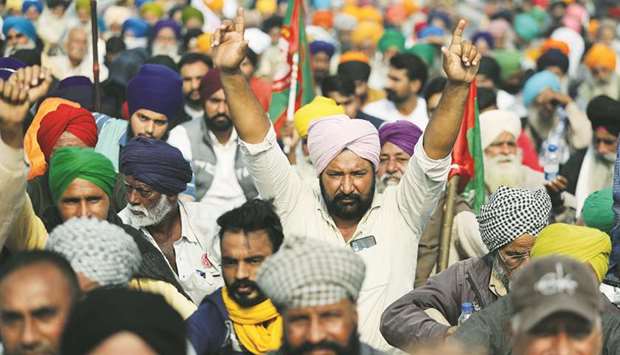The government is considering rolling back some parts of its agricultural reforms after they triggered the biggest protests by farmers in years, officials said yesterday.
Tens of thousands of farmers were out on the streets around Delhi again yesterday, rallying against three laws that the government says are meant to overhaul antiquated procurement procedures and give growers more options to sell their produce.
Farmers fear the legislation, passed in September, will eventually dismantle India’s regulated markets and stop the government from buying wheat and rice at guaranteed prices, leaving them at the mercy of private buyers.
“The government is open to look into various amendments,” a government official said, declining to be named ahead of a meeting between farmers and ministers scheduled for today.
“The government is open to the idea of imposing taxes on the new wholesale markets to keep a level playing field,” he said.
In case of a dispute between sellers and buyers, the government could also let farmers appeal to a higher court than is currently allowed under the new legislation, he added.
Two other officials said the government was considering making the same concessions, but the government spokesman was not immediately available for comment.
There was no immediate response from protesters to the official’s proposals but Kavitha Kuruganti, a farmers’ leader, told Reuters so far the government had not agreed to farmers’ demands.
Farmer leaders have demanded the government repeal the laws and retain mandatory government purchases, and said that buyers at private markets should pay the same tax as at state-run markets.
Under the Farmers’ Produce Trade and Commerce (Promotion and Facilitation) Act, one of the new laws, private players are allowed to set up wholesale markets where transactions will not attract any kind of tax.
The protests, led by influential farming groups from the grain-producing states of Haryana and Punjab, pose a crucial test for Prime Minister Narendra Modi’s ability to reform India’s vast agriculture sector, which makes up nearly 15% of the country’s $2.9tn economy and employs around half of its 1.3bn people.
Meanwhile, the protesting farmers warned that they will amplify the protest by blocking more roads and choking supply of food products to the national capital if today’s round of discussion between them and the central government fails to yield results.
Rakesh Tikait, spokesperson of Bharat Kisan Union, which is spearheading the protest at the border point, said “farmers want the government to take back the laws and make a fresh draft. Currently, it is for the corporates. The law should be for the farmers and they must be consulted. Either the government will agree to our requests tomorrow or we will keep protesting. More farmers are ready to come here.”
Another senior member of the union, on condition of anonymity, said that if the demands are not met, farmers will stay put to even witness the January 26 parade and run their tractors on the roads of the national capital.

Farmers protest against the newly passed farm bills at Singhu border near Delhi yesterday.
